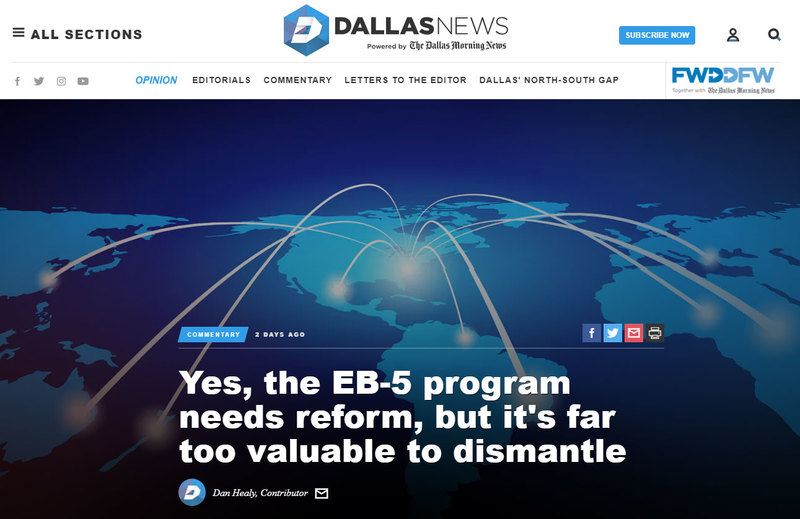Yes, the EB-5 program needs reform, but it's far too valuable to dismantle
A coordinated effort at rewriting recent economic history is underway in the Beltway, and its target is one of the most successful investment programs in our country's financial toolbox: the EB-5 immigrant investor visa program.
EB-5 critics, most prominently in a recent Wall Street Journal column, but in other media outlets as well, continue to raise legitimate concerns about fraud and corruption charges in the program. These include a well-documented, $200 million Ponzi scheme perpetrated in Vermont. In that case, one might argue that the system worked: Those fraudsters were caught and prosecuted, and they will pay for their crimes. But we can and should do better by pursuing reforms that will more effectively deter fraud and abuse and help authorities detect it sooner.
I respect and echo these calls for good, clean government. But critics badly overreach in their call on Congress to shutter the entire EB-5 program. Members of Congress on both sides of the aisle have adopted a sound approach: Mend it, don't end it. That's because EB-5 is a proven economic stimulus and job-creator. Unlike nearly every other government program, no taxpayer dollars are used. But like every government program where someone's money is at stake (which is to say, every government program) there are crooks who seek to exploit gaps, prey on the vulnerable and play the odds that they won't get caught. But we don't shutter Medicare because of the fraud and abuse that plagues it. We aggressively prosecute those who abuse the public trust and give law enforcement tools to deter and detect fraud.
Critics cite examples, several of which are simply bad business deals, rather than instances of fraud, but these amount to a tiny fraction of the EB-5 program's overall investment volume and contribution to the U.S. economy and job creation. Most-often cited is the Vermont case, the largest EB-5 fraud to date, as a prime reason for getting rid of EB-5. Indeed, it was a terrible instance of fraud. But let's put it in context. That high-profile case represents just over 1 percent of the estimated $18.4 billion of EB-5 capital investment in the U.S. through regional centers from fiscal year 2010-2015.
As well, critics ignore peer-reviewed studies that show the overall economic impact of EB-5 investment from that period. According to EB-5 trade group Invest in the USA, this includes more than 300,000 U.S jobs, $43 billion in gross national product, and $5.7 billion in U.S. tax revenue at federal, state and local levels. EB-5 fraud is a tiny percentage of overall investment, and the program has been an economic boon.
I doubt that Congress' failure to legislate integrity reforms to the program is a failure of will. A robust package of integrity reforms to EB-5 would sail through both chambers. The good actors in EB-5, which are the overwhelming majority of stakeholders, have strongly advocated for integrity reforms. But what we have is a classic case of letting the perfect be the enemy of the good. Rather than passing common-sense integrity reforms as a standalone item, leading congressional players have insisted upon a wholesale makeover of the program. And industry, for its part, is not blameless. Industry stakeholders have failed to coalesce around broader reforms that would steer more projects to rural and poor urban areas. And it has not done enough to showcase its good work, allowing a handful of bad actors to sully the reputation of the whole.
It's worth noting parenthetically that a robust regulatory and enforcement regime already exists. Jurisdiction over EB-5 is shared by the Securities and Exchange Commission, the Department of Homeland Security, the Financial industry Regulatory Authority and numerous state agencies. But major improvements are clearly necessary.
Consensus reforms include: creating a fraud prevention fund; eliminating any foreign government involvement in regional center ownership; and providing new authorities and resources for site visits to ensure that jobs claimed are jobs created. Congress could also encourage higher standards of adherence to federal securities laws by requiring EB-5 projects to have an affiliation with an SEC-registered investment adviser.
I and my fellow industry stakeholders remain committed to working with Congress to pass these needed reforms so that the good work being done by EB-5 can continue and even expand to create more economic growth and jobs. If Congress is going to insist on a comprehensive makeover of the program, industry needs to accept that fact, resolve its internal differences, and work with lawmakers to nail down the final package. As the data show, the EB-5 program is too vital to our economy to be derailed by politics.
Mentions
States
- Texas
Securities Disclaimer
This website is for informational purposes only and does not constitute an offer or solicitation to sell shares or securities. Any such offer or solicitation will be made only by means of an investment's confidential Offering Memorandum and in accordance with the terms of all applicable securities and other laws. This website does not constitute or form part of, and should not be construed as, any offer for sale or subscription of, or any invitation to offer to buy or subscribe for, any securities, nor should it or any part of it form the basis of, or be relied on in any connection with, any contract or commitment whatsoever. EB5Projects.com LLC and its affiliates expressly disclaim any and all responsibility for any direct or consequential loss or damage of any kind whatsoever arising directly or indirectly from: (i) reliance on any information contained in the website, (ii) any error, omission or inaccuracy in any such information or (iii) any action resulting therefrom.




